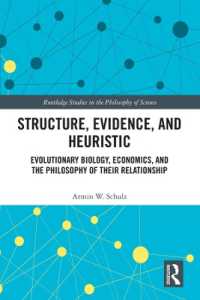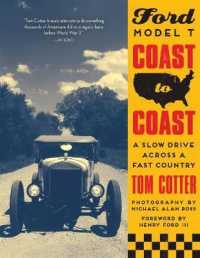- ホーム
- > 洋書
- > ドイツ書
- > Humanities, Arts & Music
- > Linguistics
- > general surveys & lexicons
Description
This is the first book to explore the history of self-translation in Chinese. It reveals how self-translation was widespread among literary authors during one of the most fertile periods of translation in human history, an era that marks both the dawn of modern Chinese literature and the foundation of the Republic of China (1912 1949). The crucial role translation played in this period remains unknown to a great many readers and researchers in the West, but the book establishes why this is also a golden age of literary self-translation, globally considered. It examines the motivations, affiliations and writing practices of key self-translators, exploring canonical figures such as Lu Xun, Lao She and Lin Yutang as well as lesser-known figures. In-depth studies analyse the fascinating but neglected prodigy Liang Zongdai and offer new perspectives on the literary celebrity Eileen Chang. The period is considered in relation to international research trends, and through the innovative frameworks of global Modernisms and Western Orientalism. This book will be of interest to students and researchers in the disciplines of translation studies, Chinese studies, comparative literature, Chinese literature and literatures in French and English.
Chapter 1: Introduction.- Chapter 2: Republican China.- Chapter 3: Self-Translation in the PRC Since 1949.- Chapter 4: Self-Translation in and from Taiwan and Hong Kong.- Chapter 5: Chinese-Language Self-Translation in Southeast Asia and in the West.- Chapter 6: The Reception of Chinese Self-Translation in Chinese.- Chapter 7: Conclusion.Anthony Cordingley teaches at the University of Sydney, Australia and Université Paris 8, France. His research focuses on Modernist and contemporary literature, multilingual writing and translation. A specialist in self-translation, his previous work includes Self-Translation: Brokering Originality in Hybrid Culture (2013).
Josh Stenberg teaches Chinese and diasporic literature and theatre at the University of Sydney, Australia. He is the author of Minority Stages: Sino-Indonesian Performance and Public Display (2019) and Liyuanxi: Chinese Pear Garden Theatre (2022), and is also the translator of seven books of contemporary Chinese fiction and poetry.








